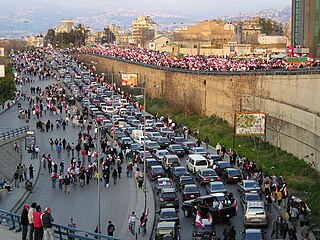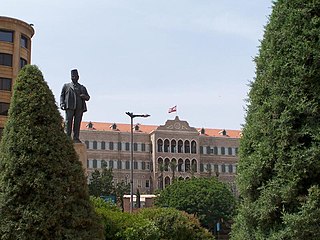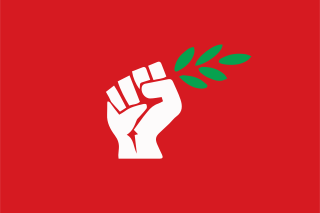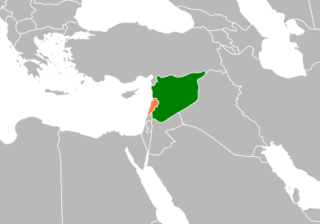
Lebanon, officially the Republic of Lebanon, is a country in the Levant region of West Asia, bordered by Syria to the north and east, Israel to the south, and the Mediterranean Sea to the west; Cyprus lies a short distance from the country's coastline. It is at the crossroads of the Mediterranean Basin and the Arabian Peninsula. Lebanon has a population of more than five million and an area of 10,452 square kilometres (4,036 sq mi). Beirut is the country's capital and largest city.

The history of Lebanon covers the history of the modern Republic of Lebanon and the earlier emergence of Greater Lebanon under the French Mandate for Syria and the Lebanon, as well as the previous history of the region, covered by the modern state.

The economy of Lebanon has been experiencing a large-scale multi-dimensional crisis since 2019, including a banking collapse, the Lebanese liquidity crisis and a sovereign default. It is classified as a developing, lower-middle-income economy. The nominal GDP was estimated at $19 billion in 2020, with a per capita GDP amounting to $2,500. In 2018 government spending amounted to $15.9 billion, or 83% of GDP.
Postal services and telecommunications have long played an essential role in Lebanon, a small country with an expansive diaspora, a vivid media landscape, and an economy geared toward trade and banking. The sector's history has nonetheless been chaotic, marked by conflict but also, and perhaps most importantly, a deeply rooted legacy of state control, weak competition, and intense politicization. A combination of poor services and high prices culminated in popular protests against the government's attempt, in October 2019, to tax the widely used messaging service WhatsApp. The anger this measure triggered captured a more general sense of dissatisfaction, and contributed to tipping the country into a protracted crisis. Civil unrest coincided with Lebanon's default on its ballooning debt; in the ensuing economic collapse, telecommunications have been among the infrastructure most affected.

Beirut is the capital and largest city of Lebanon. As of 2014, Greater Beirut has a population of 2.5 million, which makes it the fourth-largest city in the Levant region and the seventeenth-largest in the Arab world. The city is situated on a peninsula at the midpoint of Lebanon's Mediterranean coast. Beirut has been inhabited for more than 5,000 years, making it one of the oldest cities in the world.

Rafic Bahaa El Deen al-Hariri, also known as Rafiq al-Hariri, was a Lebanese businessman and politician, who served as the Prime Minister of Lebanon from 1992 to 1998 and again from 2000 until he resigned on 20 October 2004, before his assassination in 2005.
The Taif Agreement, officially known as the National Reconciliation Accord, was reached to provide "the basis for the ending of the civil war and the return to political normalcy in Lebanon". Negotiated in Taif, Saudi Arabia, it was designed to end the 15 year-long Lebanese Civil War, and reassert Lebanese government authority in southern Lebanon, which was controlled at the time by the Christian-separatist South Lebanon Army under the occupational hegemony of Israel. Though the agreement set a time frame for withdrawal of Syrian military forces from Lebanon, stipulating that the Syrian occupation end within two years, Syria did not withdraw its forces from the country until 2005. It was signed on 22 October 1989 and ratified by the Lebanese parliament on 5 November, 1989.

Michel Naim Aoun is a Lebanese politician and former general who served as the 13th President of Lebanon from 31 October 2016 to 30 October 2022.

The Cedar Revolution or the Independence Intifada was a chain of demonstrations in Lebanon triggered by the assassination of former Lebanese Prime Minister Rafic Hariri. The popular movement was remarkable for its avoidance of violence, peaceful approach, and its total reliance on methods of civil resistance.
Solidere s.a.l. is a Lebanese joint-stock company in charge of planning and redeveloping Beirut Central District following the conclusion, in 1990, of the Lebanese Civil War. By agreement with the government, Solidere has special powers of eminent domain as well as a limited regulatory authority codified in law, making the company a form of public-private partnership.

The Grand Serail is the headquarters of the Prime Minister of Lebanon. It is situated atop a hill in downtown Beirut a few blocks away from the Lebanese Parliament building. The Grand Serail is a historic building, the most important of three Ottoman monuments on the Serail hill, the others being the Council for Development and Reconstruction and the Hamidiyyeh clock tower.

The Beirut Central District is the historical and geographical core of Beirut, the capital of Lebanon. Also called downtown Beirut, it has been described as the “vibrant financial, commercial, and administrative hub of the country.” It is thousands of years old, with a traditional focus of business, finance, culture, and leisure.

The March 14 Alliance, named after the date of the Cedar Revolution, was a coalition of political parties and independents in Lebanon formed in 2005 that were united by their anti-Syrian stance and by their opposition to the March 8 Alliance. It was led by Saad Hariri, Walid Jumblatt and Samir Geagea, as well as other prominent figures.

The 2006–2008 Lebanese protests were a series of political protests and sit-ins in Lebanon that began on 1 December 2006, led by groups that opposed the US and Saudi-backed government of Prime Minister Fouad Siniora and ended on 21 May 2008 with the signing of the Doha Agreement. The opposition was made up of Hezbollah, Amal, and the Free Patriotic Movement (FPM); a number of smaller parties were also involved, including the Marada party, the Lebanese Communist Party and the Syrian Social Nationalist Party. A majority of the members of the government were part of the anti-Syrian March 14 Alliance, a coalition of political parties and independents in Lebanon. The two groups were also divided along religious lines, with most Sunnis and Druze supporting the government, and most Shi'a supporting the opposition. The Christian community was split between the two factions, with Michel Aoun, the leader of the FPM, claiming to have more than 70% support among the Christians, based on the results of the 2005 parliamentary election.

Lebanon–Syria relations were officially established in October 2008 when Syrian President Bashar Al-Assad issued a decree to establish diplomatic relations with Lebanon for the first time since both countries gained independence from France in 1943 (Lebanon) and 1946 (Syria). Lebanon had traditionally been seen by Syria as part of Greater Syria. Following World War I, the League of Nations Mandate partitioned Ottoman Syria under French control, eventually leading to the creation of nation-states Lebanon and Syria.

Israel–Lebanon relations have experienced ups and downs since their establishment in the 1940s.

France–Lebanon relations are the international relations between France and Lebanon. France, the previous administrative power, enjoys friendly relations with Lebanon and has often provided support to the Lebanese. The French language is widely spoken fluently throughout Lebanon and is taught as well as used as a medium of education in many Lebanese schools. Both nations are members of the Francophonie.
Water supply and sanitation in Lebanon is characterized by a number of achievements and challenges. The achievements include the reconstruction of infrastructure after the 1975–90 Civil War and the 2006 war with Israel, as well as the reform of the water and sanitation sector through a water law passed in 2000. The law created four Regional Water Establishments to consolidate numerous smaller utilities.
One of the major environmental issues in Lebanon is water supply. The country has greater water resources than many other Middle Eastern countries; however, it is at increasing risk of shortages, particularly during the dry summers. This is due to lack of storage capacity, to increasing demand, and to climate change. Large-scale projects to improve water supply are funded by the government and by foreign agencies, and include the Greater Beirut Water Supply Project and the Litani River Authority.

The diplomatic relations between Lebanon and Saudi Arabia are the relationship between two Arab nations in the Middle East. Lebanon has an embassy in Riyadh and Saudi Arabia has an embassy in Beirut.
















